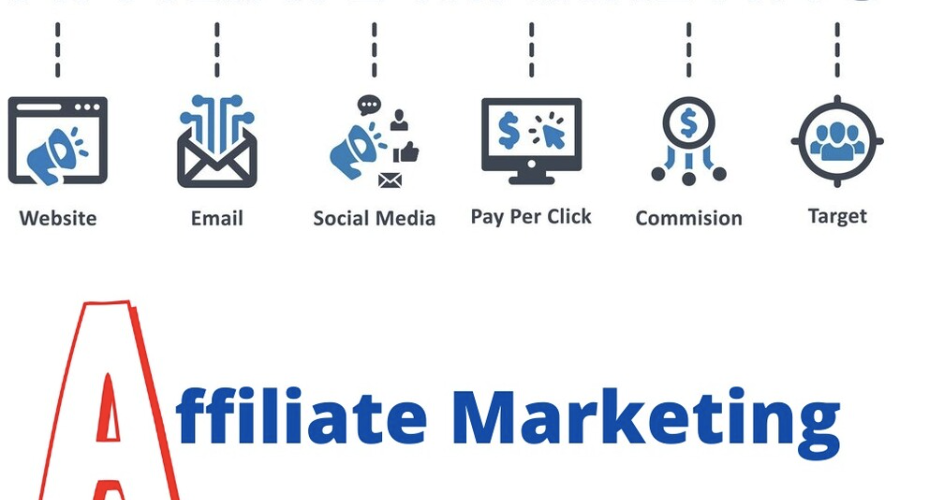Contents
- 1 What is Affiliate Marketing?
- 2 How Does Affiliate Marketing Work?
- 3 Benefits of Affiliate Marketing
- 4 Common Affiliate Marketing Terms and Concepts
- 5 Finding the Right Affiliate Program
- 6 Choosing the Right Products to Promote
- 7 Building a Successful Affiliate Marketing Website
- 8 Strategies for Driving Traffic to Your Affiliate Site
- 9 Tracking and Measuring Your Affiliate Marketing Success
- 10 Avoiding Common Affiliate Marketing Mistakes
- 11 Scaling Your Affiliate Marketing Business
- 12 Affiliate Marketing Tips and Tricks
- 13 Resources for Learning More About Affiliate Marketing
- 14 Conclusion
What is Affiliate Marketing?
Affiliate marketing is a performance-based marketing strategy where businesses reward affiliates for each customer or visitor they bring to the company’s website through their own marketing efforts. In simpler terms, it’s a way for businesses to tap into a network of online publishers and influencers to promote their products or services in exchange for a commission on any resulting sales.
As an affiliate marketer, you can earn a commission by promoting other companies’ products or services on your own website, blog, or social media channels. This allows you to generate passive income by leveraging the reach and influence of your online presence.

Affiliate Marketing
How Does Affiliate Marketing Work?
The basic mechanics of affiliate marketing are quite straightforward:
- Businesses (Merchants): These are the companies that offer affiliate programs, providing affiliates with unique tracking links or banners to promote their products or services.
- Affiliates (Publishers): These are the individuals or entities that promote the merchants’ offerings on their own platforms, such as websites, blogs, social media, or email lists.
- Customers: When a customer clicks on the affiliate’s unique tracking link and makes a purchase, the affiliate earns a commission from the merchant.
The commission rates can vary widely, typically ranging from a few percent to as high as 50% or more, depending on the product, industry, and the terms of the affiliate program.

Affiliate Marketing
Benefits of Affiliate Marketing
Affiliate marketing offers numerous benefits for both merchants and affiliates:
- Passive Income: As an affiliate, you can earn a steady stream of passive income by promoting products or services that align with your audience’s interests.
- Low Startup Costs: Affiliate marketing has a low barrier to entry, as you can often get started with little to no upfront investment.
- Flexibility: Affiliate marketing allows you to work on your own schedule and choose the products or services you want to promote.
- Scalability: Successful affiliate marketing campaigns can be easily scaled up by promoting more products, reaching a larger audience, or diversifying your income streams.
- Measurable Results: Affiliate marketing provides clear tracking and analytics, allowing you to measure the performance of your campaigns and optimize your efforts accordingly.
Common Affiliate Marketing Terms and Concepts
Before diving into the world of affiliate marketing, it’s important to familiarize yourself with the following key terms and concepts:
- Affiliate Program: The platform or network that connects merchants with affiliates.
- Tracking Link: A unique URL that allows merchants to track the sales or leads generated by a specific affiliate.
- Commission: The percentage or fixed amount of revenue that an affiliate earns for each successful sale or lead.
- Conversion Rate: The ratio of visitors who take a desired action, such as making a purchase or filling out a form.
- Click-Through Rate (CTR): The percentage of people who click on a specific link or advertisement.
- Impressions: The number of times a piece of content or advertisement is displayed to a user.
- Referral: A customer or lead that an affiliate has successfully directed to the merchant’s website.
- Payout Threshold: The minimum amount of earnings an affiliate must accumulate before they can receive their commission.
Finding the Right Affiliate Program
Choosing the right affiliate program is crucial for the success of your affiliate marketing efforts. Here are some factors to consider when selecting an affiliate program:
- Relevance: The products or services offered by the merchant should be relevant to your audience and align with the content or theme of your website or platform.
- Commission Rates: Aim for programs that offer competitive commission rates, as this will directly impact your earning potential.
- Reputation: Research the merchant’s brand, customer reviews, and the overall reputation of their affiliate program.
- Payment Terms: Understand the payment structure, including the frequency of payouts and any payout thresholds.
- Marketing Resources: Look for programs that provide affiliates with high-quality marketing materials, such as banners, product images, and promotional content.
- Tracking and Reporting: Ensure that the affiliate program offers robust tracking and reporting capabilities to help you monitor your performance.

Finding the Right Affiliate Program
Choosing the Right Products to Promote
When selecting products or services to promote as an affiliate, consider the following criteria:
- Demand: Choose products that have a proven market demand and are in high-interest categories.
- Commission Rates: Opt for products with attractive commission rates that can maximize your earning potential.
- Quality: Promote products or services that you believe in and would recommend to your audience.
- Competitiveness: Research the competition and look for products or services that offer a unique value proposition.
- Recurring Revenue: Consider products or services that offer recurring or subscription-based revenue models, as they can provide a more stable and predictable income stream.

Affiliate Marketing
Building a Successful Affiliate Marketing Website
Creating a dedicated website or blog for your affiliate marketing efforts can be a powerful strategy. Here are some key elements to consider:
- Niche Expertise: Establish your website as an authoritative source of information in a specific niche or industry.
- Valuable Content: Provide your audience with high-quality, informative, and engaging content that addresses their pain points and interests.
- Affiliate Disclosure: Clearly disclose your affiliate relationships to maintain transparency with your audience.
- User Experience: Optimize your website’s design, navigation, and overall user experience to enhance engagement and conversions.
- Search Engine Optimization (SEO): Implement effective SEO strategies to improve your website’s visibility and organic traffic.
Strategies for Driving Traffic to Your Affiliate Site
Driving targeted traffic to your affiliate website is crucial for generating sales and commissions. Here are some effective strategies to consider:
- Content Marketing: Consistently create and publish valuable, informative, and engaging content that appeals to your target audience.
- Social Media Promotion: Leverage popular social media platforms to share your content and engage with your followers.
- Email Marketing: Build an email list of interested subscribers and send them targeted offers and updates.
- Influencer Partnerships: Collaborate with relevant influencers or industry experts to reach a wider audience.
- Paid Advertising: Experiment with paid advertising channels, such as search engine ads or social media advertising, to drive targeted traffic.
- Affiliate Network Promotion: Utilize the marketing resources and promotional tools provided by your affiliate network or program.
Tracking and Measuring Your Affiliate Marketing Success
Effective tracking and measurement are essential for optimizing your affiliate marketing efforts. Key metrics to monitor include:
- Click-Through Rate (CTR): Track the number of clicks on your affiliate links or advertisements.
- Conversion Rate: Monitor the percentage of visitors who take a desired action, such as making a purchase.
- Revenue: Closely track the total revenue generated from your affiliate marketing activities.
- Earnings per Click (EPC): Calculate the average earnings you receive for each click on your affiliate links.
- Return on Investment (ROI): Analyze the overall profitability of your affiliate marketing campaigns.
Avoiding Common Affiliate Marketing Mistakes
To ensure the long-term success of your affiliate marketing endeavors, it’s important to steer clear of the following common pitfalls:
- Promoting Low-Quality Products: Carefully vet the products or services you promote to maintain your credibility and trust with your audience.
- Lack of Transparency: Always disclose your affiliate relationships and any potential conflicts of interest.
- Reliance on a Single Income Stream: Diversify your affiliate marketing portfolio to mitigate the risk of over-dependence on a single program or product.
- Neglecting Content Quality: Prioritize the creation of high-quality, valuable content that resonates with your target audience.
- Ignoring Performance Tracking: Regularly monitor your key metrics and adjust your strategies accordingly.
Scaling Your Affiliate Marketing Business
As your affiliate marketing efforts gain traction, consider the following strategies to scale your business:
- Expand Your Product Offerings: Diversify your affiliate portfolio by promoting a wider range of products or services that cater to your audience’s evolving needs.
- Leverage Multiple Affiliate Programs: Join additional reputable affiliate programs to increase your earning potential and reduce your reliance on a single source of income.
- Outsource and Automate: Delegate tasks such as content creation, website management, or customer support to free up your time and resources for high-impact activities.
- Invest in Paid Advertising: Allocate a portion of your earnings towards targeted paid advertising campaigns to drive more traffic and sales.
- Collaborate with Influencers: Forge partnerships with influential figures in your niche to tap into their established audiences and boost your visibility.

Affiliate Marketing
Affiliate Marketing Tips and Tricks
To further enhance your affiliate marketing success, consider the following tips and tricks:
- Stay Up-to-Date: Continuously educate yourself on the latest trends, best practices, and industry changes in the world of affiliate marketing.
- Personalize Your Approach: Tailor your marketing messages and product recommendations to the unique needs and preferences of your audience.
- Leverage Video Content: Incorporate engaging video content, such as product demos or tutorials, to enhance the user experience and boost conversions.
- Experiment with Different Promotions: Test various promotional tactics, such as limited-time offers, bundle deals, or seasonal discounts, to find what resonates best with your audience.
- Analyze and Optimize: Regularly review your performance data and adjust your strategies accordingly to maximize your earnings.
If you’re ready to start your own successful affiliate marketing journey, sign up for our exclusive training program today. Our comprehensive course will guide you step-by-step through the process of building a profitable affiliate marketing business. Click here to learn more and secure your spot!
Resources for Learning More About Affiliate Marketing
To further your knowledge and skills in affiliate marketing, consider exploring the following resources:
- Affiliate Marketing Blogs: Stay informed by reading industry-leading blogs, such as Affiliate Marketing Blog, Commission Junction, and Affiliate Summit.
- Podcasts: Listen to informative affiliate marketing podcasts, like The Affiliate Marketing Podcast, Affiliate Marketing Mastery, and The Affiliate Guy.
- Online Courses: Enroll in comprehensive affiliate marketing courses, such as those offered by Udemy, Coursera, or Skillshare.
- Affiliate Marketing Forums: Engage with a community of affiliate marketers on platforms like Warrior Forum, DigitalPoint, and Affiliate.com.
- Books: Read books that delve deeper into the world of affiliate marketing, such as “Affiliate Marketing for Beginners” by Noah Gray and “The Affiliate Marketing Playbook” by Shawn Collins.
Conclusion
Affiliate marketing offers a powerful opportunity to generate passive income and build a successful online business. By understanding the fundamentals, choosing the right affiliate programs, creating valuable content, and implementing effective marketing strategies, you can unlock the secrets to achieving affiliate marketing success.
Remember, the key to long-term success in affiliate marketing lies in your ability to provide genuine value to your audience, build trust, and continuously adapt to the ever-evolving landscape. With dedication, persistence, and a willingness to learn, you can transform your affiliate marketing efforts into a thriving source of passive income.
So, what are you waiting for? Start your affiliate marketing journey today and take the first step towards financial freedom and a more rewarding online presence.
